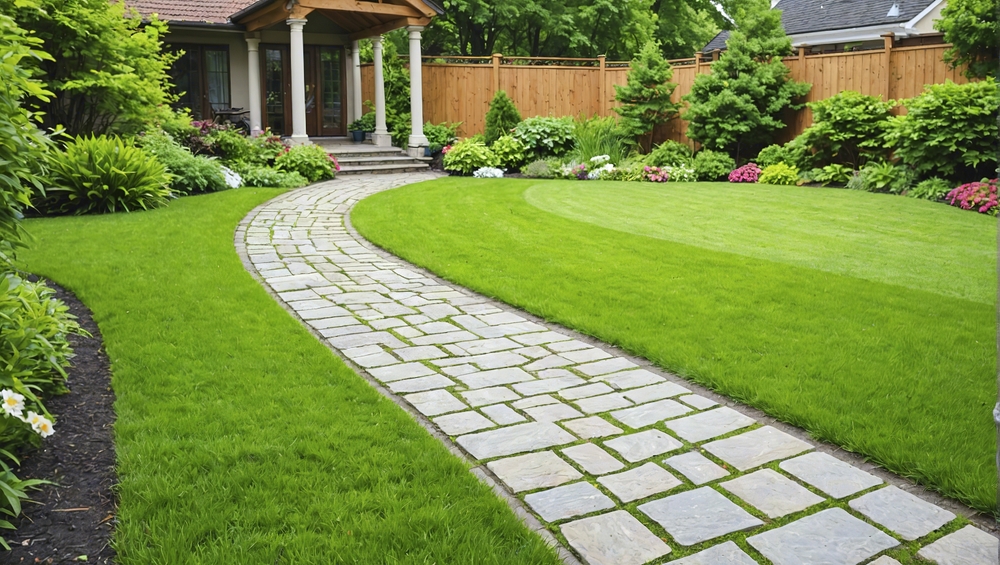Eco-Friendly Landscaping in West Chester: Sustainable Practices for a Greener Yard

Eco-friendly landscaping has become more than just a trend—it’s a necessity. As homeowners in West Chester increasingly recognize the importance of sustainability, the demand for green practices in gardening and landscaping is on the rise. In this blog post, we’ll explore sustainable landscaping practices that can transform your yard into an eco-friendly haven while contributing positively to the environment.
What is Sustainable Landscaping?
Sustainable landscaping refers to practices that are designed to minimize environmental impact, conserve resources, and create a balance between human needs and natural ecosystems. By implementing sustainable landscaping techniques, you can enhance the beauty of your yard while promoting environmental health.
Benefits of Eco-Friendly Landscaping
Embracing sustainable landscaping offers numerous benefits:
- Conserves Water: Sustainable landscaping techniques help reduce water usage by incorporating drought-tolerant plants and efficient irrigation systems.
- Reduces Waste: Composting and using recycled materials help minimize waste and enrich soil.
- Promotes Biodiversity: Native plants and wildlife-friendly features support local ecosystems and provide habitats for various species.
- Improves Soil Health: Natural fertilizers and organic practices enhance soil quality without the need for harmful chemicals.
- Saves Energy: Strategic planting and shading can reduce energy consumption by cooling your home naturally.
Sustainable Landscaping Practices for West Chester
1. Choose Native Plants
One of the cornerstones of sustainable landscaping is the use of native plants. These plants are well-adapted to the local climate and soil conditions, requiring less water and maintenance compared to non-native species. In West Chester, consider incorporating plants such as:
- Black-eyed Susan (Rudbeckia hirta)
- Eastern Redbud (Cercis canadensis)
- Coneflower (Echinacea purpurea)
- Virginia Bluebell (Mertensia virginica)
2. Implement Efficient Irrigation Systems
Water conservation is crucial in sustainable landscaping. Here are some methods to reduce water usage:
- Drip Irrigation: Delivers water directly to the plant roots, minimizing evaporation and runoff.
- Rain Barrels: Collect and store rainwater for use in watering plants.
- Soil Moisture Sensors: Monitor soil moisture levels to ensure you’re only watering when necessary.
3. Use Organic Mulch
Organic mulch, such as wood chips, straw, or leaf litter, offers multiple benefits:
- Reduces Weed Growth: Helps suppress weeds and reduces the need for chemical herbicides.
- Conserves Moisture: Retains soil moisture, reducing the frequency of watering.
- Improves Soil Health: As it decomposes, organic mulch adds nutrients to the soil.
4. Practice Composting
Composting is a sustainable way to recycle organic waste and improve soil health. You can compost kitchen scraps, yard waste, and other organic materials to create nutrient-rich compost for your garden. Benefits of composting include:
- Reducing Landfill Waste: Minimizes the amount of waste that ends up in landfills.
- Enhancing Soil Fertility: Provides essential nutrients to the soil, promoting healthy plant growth.
- Improving Soil Structure: Increases soil aeration and water-holding capacity.
5. Create Wildlife Habitats
Incorporating elements that support local wildlife is an important aspect of sustainable landscaping. Consider adding:
- Bird Feeders and Baths: Attract and support local bird species.
- Bee and Butterfly Gardens: Plant nectar-rich flowers to attract pollinators.
- Habitat Structures: Install birdhouses, bat boxes, and native shrubs to provide shelter for wildlife.
6. Reduce Lawn Area
Traditional lawns require significant amounts of water, fertilizers, and pesticides. Reducing the size of your lawn and replacing it with other landscaping elements can be more sustainable. Alternatives include:
- Ground Covers: Use low-maintenance ground covers like clover or sedum to replace traditional grass.
- Paved or Gravel Areas: Incorporate permeable paving or gravel paths to reduce lawn area and improve drainage.
- Vegetable Gardens: Grow your own vegetables and herbs to reduce the need for store-bought produce.
7. Opt for Sustainable Hardscaping Materials
When selecting materials for pathways, patios, and other hardscaping features, choose sustainable options such as:
- Recycled Materials: Use reclaimed bricks, pavers, or stone for a lower environmental impact.
- Permeable Pavers: Allow water to seep through, reducing runoff and promoting groundwater recharge.
- Locally Sourced Materials: Minimize transportation emissions by selecting materials sourced from nearby suppliers.
Maintaining Your Eco-Friendly Landscape
Maintaining a sustainable landscape involves ongoing care and attention. Regularly monitor your garden for pests and diseases, and use organic solutions when necessary. Keep an eye on water usage, and make adjustments to irrigation systems as needed. By staying engaged with your landscape, you’ll ensure its continued health and sustainability.
Conclusion
Eco-friendly landscaping is not only beneficial for the environment but also enhances the beauty and functionality of your outdoor space. By incorporating sustainable practices such as choosing native plants, implementing efficient irrigation systems, and using organic mulch, you can create a greener, healthier yard in West Chester. Embrace these practices and enjoy the rewards of a sustainable landscape that supports both your local ecosystem and your lifestyle.
Need Landscapers in Upstate NY?
Welcome to Rand Hill Lawns, Inc.! We are a family-owned and -operated business that has served the Plattsburgh community since 1986. We are your go-to lawn care consultants! Whether you need landscaping, snow removal, excavating, paving, tree removal, stump removal, or fertilizer, we can do it all. We will not stop working until we get the job done for you! We are licensed and have 30 years of experience in lawn care services. Contact us today for a free estimate!
Categorised in: Landscaping
